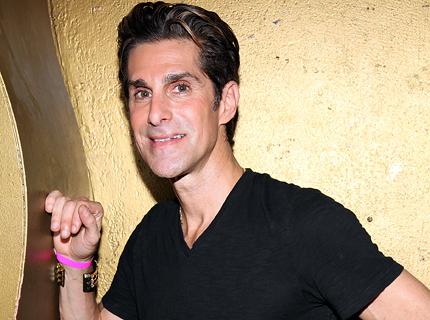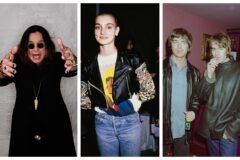Friday, January 28, was a very big day for alt-rock pioneer Perry Farrell.
He celebrated his ninth wedding anniversary at the Sundance Film Festival in Park City, Utah, with his wife and collaborator, Etty Lau, and unveiled the lineup for Lollapalooza Chile, the first international installment of the legendary rock fest, which he founded 20 years ago. He was also preparing to hit the studio with Jane’s Addiction the following Monday to work on their long-awaited fourth album, The Great Escape Artist.
After a few setbacks, including the departure of founding bassist Eric Avery and his short-lived replacement, ex-Guns N’ Roses low-ender Duff McKagan, Farrell, guitarist Dave Navarro, and drummer Stephen Perkins will hole up in a Los Angeles studio with their new songwriting partner, TV on the Radio multi-instrumentalist and production whiz Dave Sitek, to bring to life the musical ideas they have been trading online.
“We are taking great risks and writing in ways that we have never written before,” Farrell, 51, says of the bandmembers, who are embracing digital technology — synths, MIDI, effects, et al. — for the first time in their 25-year career. “We’re producing a really amazing piece of art, an amazing piece of music. It will make people say, ‘This is strangely beautiful.'”
How did TV on the Radio’s Dave Sitek get involved with the new Jane’s Addiction LP?
When Duff McKagan decided he didn’t want to work with us anymore, there was a moment of silence. Everyone had gripes, but at the same time, it was a sad time because we were building something together. It’s like a sports team, then one guy gets traded or retires or gets injured. But your team has to go on. That’s the state we were in. Our producer Rich Costey (Muse, Rage Against The Machine, My Chemical Romance, Weezer, Franz Ferdinand) said, ‘Hey, I have a friend…’ and it was Dave. Rich said, ‘If you guys work together, there would be explosions.’ So I looked Dave up. He was just finishing up a record of his own. But when we met, he was very enthusiastic. He’s a true artist and with an original, contemporary sound.
Is he a permanent member of Jane’s, then? Will he play with the band live?
Well, Dave’s in TV on the Radio and he loves producing. I raised the idea of him playing with us. It makes sense since he’s helping write and record. But I sense that his heart is in producing and writing and constantly doing that. I’m just happy that we’re friends and writing partners. He’s like a pretty girl that I’m sleeping with but don’t have to marry [laughs]. But playing live is where it’s at. It’s as important as a record and, some might say, even more important. The record is a calling card and it’s a tombstone — it’s what you leave behind and also what you’re presenting to people.
What, exactly, is the creative process for the LP?
We are writing now like a modern band would write. When we started in the mid-’80s there wasn’t personal computers. I’m very excited about all those technological aspects of music. So, our creative process is very different. We have options now to make music through technology and we’re taking advantage of it; we’re not afraid of it. But we’re not just slapping loops together. We’re true musicians. We’re using technology for ideas and some of those ideas remain in the song. We’ll write some tracks and send them back and forth, and we’ll deconstruct a demo. Paradigms start to appear from this digital correspondence. We’ve already written three albums worth of music. But today, with everyone’s short attention span, we’ll only have nine songs on the album. You know, refine it down to 45 minutes of material. Next week, when we finally get into the studio together, these loops and electronic ideas that we’ve written through email will come together.
How do the songs sounding compared to previous Jane’s releases?
Well, all I can say is that we’re on the right track. It would be easy to say, ‘I’ve got a big reputation. You’re not going to tell me how to write a song. I know how to write a song. I know how to play my instrument. And here’s an idea.’ That’s not going to cut it today. Everybody’s ears need to be excited with fresh sounds, interesting chord structures, arrangements, and compositions. And it’s not easy to come up with something original and fresh. What can help you are electronics. They’ve helped me to not rush and not be full of myself and realize my reputation isn’t going to get you by.
You’re recording many of the vocals alone for the first time ever. Is it difficult to self edit, when in the past the band would express their opinions?
Everybody is of course allowed their opinion. If they don’t like something, they express it, usually, by not saying anything. Like, I won’t get an email that says, ‘Oh my god, that’s a killer vocal!’ I did one track that I thought was really funny. It was a song called, ‘I Can’t Party Anymore,’ and I didn’t hear anything back so I assumed they hated it. But then the very next song I sent in started a rapid fire. Within hours the band was emailing me, ‘I love it,’ and all that. I’m very fortunate that I get to write all the music that I want. I write contemporary rock with Jane’s. And I also write house music with people like Kascade. Luckily, I have dual worlds. I can always escape to another world if I want to be sarcastic or punk. Or another to be romantic…
Which brings up to the LP’s title, The Great Escape Artist. What’s the significance?
I love being able to escape my past, even though my past was great. I just love the future even more. I can personally not give a shit about what I’ve done in the past; I don’t want it to handicap me from doing something even better in the future. The only way to do that is to have courage to escape the past — both the mistakes and the remarkable things. You have to take risks. When it comes to being a musician and especially a live musician, I’ve thought long and hard about what type of music I’ve wanted to make. There have been people that have made protest or social commentary music, then there’s music made to escape. Jimi Hendrix’s music was escapism. Ziggy Stardust is escapism. Iggy Pop. They’re not hung up on making people bummed out or angry. Their intent is to have people escape, like they have amnesia as to what their life is really about. It’s about going to a place where they can be happy and wild and loose and sexual.
So, when you need to escape what do you do?
Music is always my great escape. I’ll perform with Etty, or I’ll DJ. Or I’ll play live with Jane’s, which is always an escape. I get to be that wild child and do whatever the hell I want onstage. And then to escape from music I’ll do board sports. I still love snowboarding and surfing and skateboarding. My next snowboarding trip is to Whistler for my birthday. It’s beautiful there. I ride bikes too. Actually, I have a bike that Lance Armstrong gave me when he won his sixth title. I love to go for long bike rides along the California coastline.
It’s almost like a replacement for drugs…
Yeah! Exactly! I aspire to be the great escape artist.





